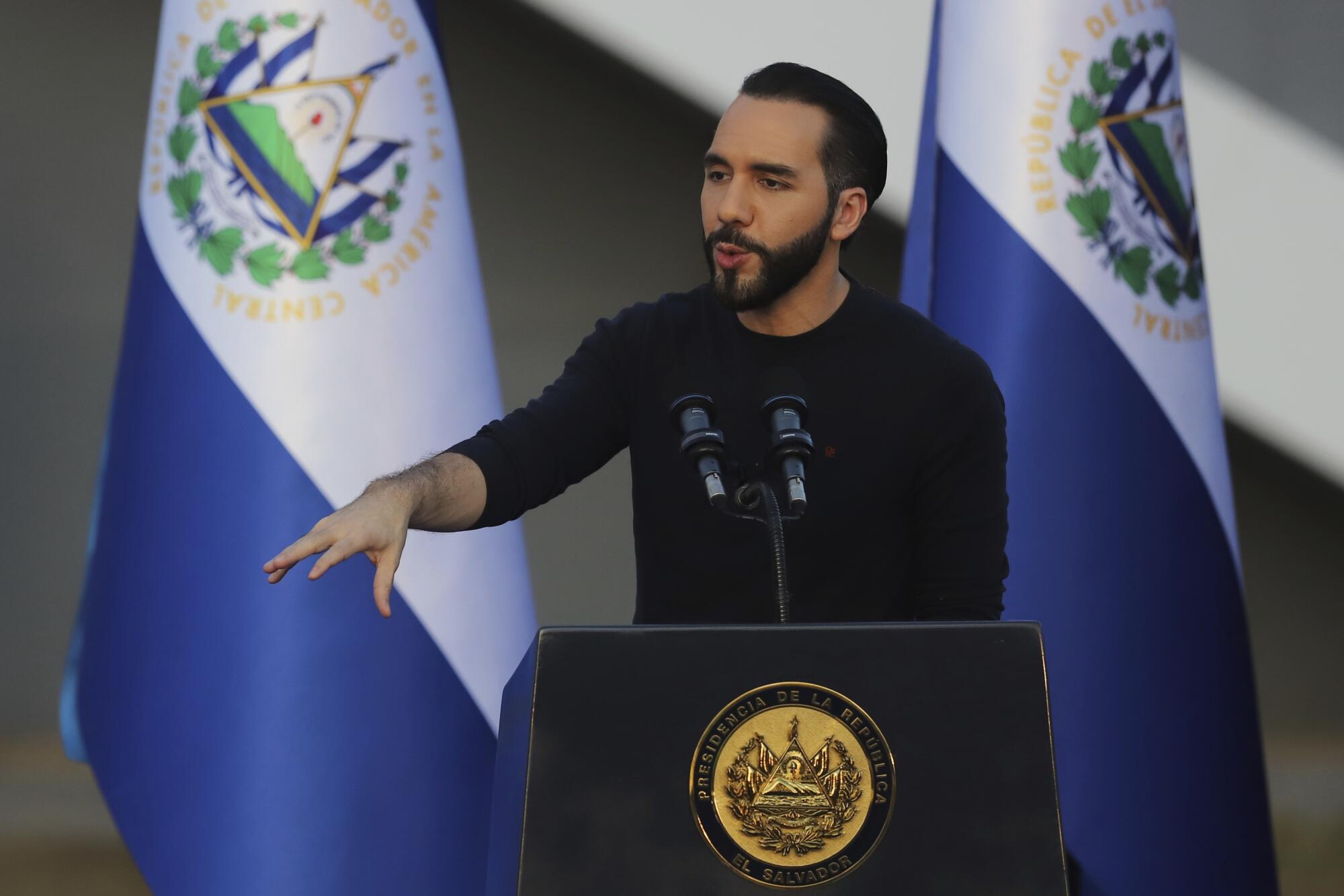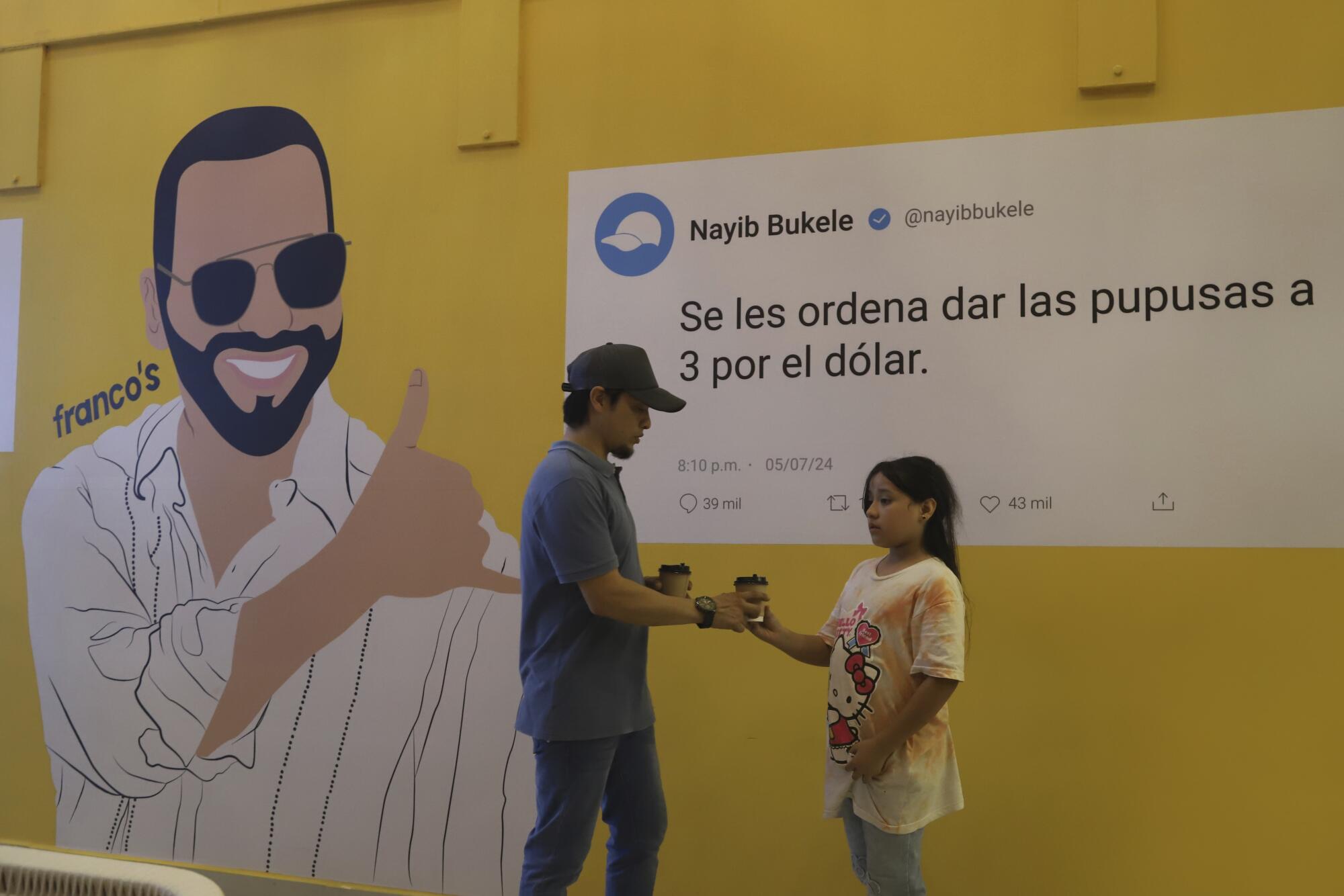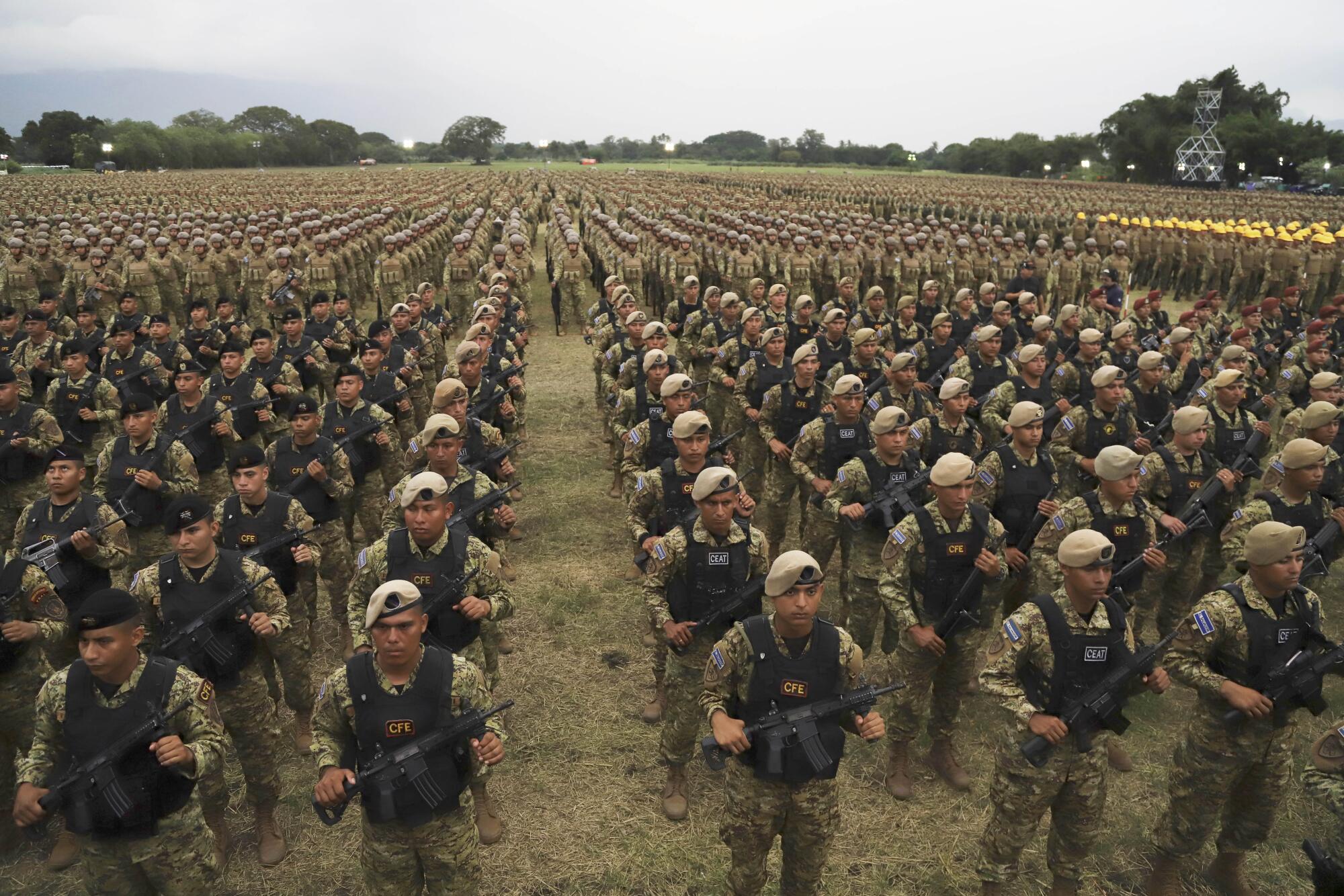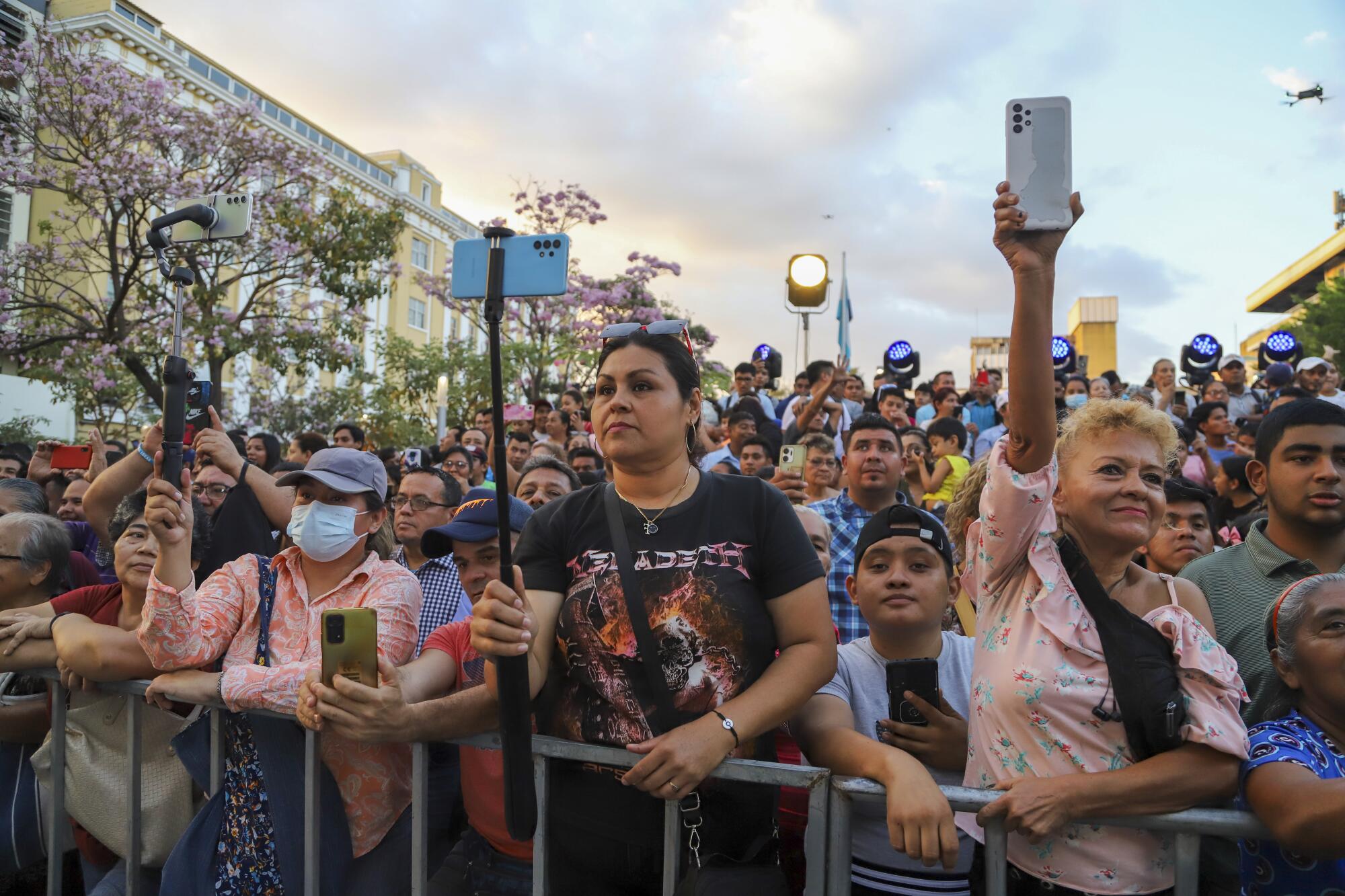
- Share via
SAN SALVADOR — The last time I was in El Salvador, nearly a decade ago, the capital was gripped by the violence of gangs who terrified people — dictating where they could shop, work, go to school or even cross a street.
Homicides were mounting steadily, with little police investigation and no justice. Bodies were being dumped on neighborhood sidewalks and in clandestine graves. “We don’t even exhume many of the [mass] graves,” Dr. Saul Quijada, a forensic physician working at one of the city’s morgues, told me in April 2015.
Returning this summer, San Salvador was transformed. It was safe to walk out at night, to move around the city as normally as one might in a U.S. capital. Officially, at least, only a handful of people were being murdered per capita, fewer than in Los Angeles or Washington, on a daily basis.
But at what cost has this change come about?

Claiming credit for the new atmosphere is the autocratic president of El Salvador, Nayib Bukele, who assumed a constitutionally suspect second term in office in June. The inauguration was attended by some of Bukele’s biggest admirers, including Donald Trump Jr. and former Fox TV host Tucker Carlson.
Bukele has built a well-financed PR machine that touts his administration’s ability to reduce the homicide rate in El Salvador to a fraction of its past numbers.
In crafting a carefully orchestrated public persona, he has also trampled on human rights and worked to dismantle democracy, critics say.
Outside analysts question the statistics that Bukele frequently cites. But such doubts have not stopped politicians from across the Americas from voicing admiration for Bukele, a 43-year-old ad man with almost no political experience.
Bukele and government officials declined to comment for this story. He has dismissed accusations of corruption, abuse and rights violations as the propaganda of his enemies.
He began to dabble in electoral politics when he ran successfully for mayor of San Salvador in 2015, allied at first with the leftist ideas of the former guerrillas who fought in the country’s civil war, the Farabundo Marti National Liberation Front, and then abruptly shifting to the right and hitching his wagon to conservative so-called family values — adamantly opposing LGBTQ rights, women’s equality and abortion.
Bukele has said he wants to be the “world’s coolest dictator.”

Assuming crime has been reduced by as much as the government claims, the question is how. For the last two and a half years, Bukele has been ruling under a “state of exception,” essentially an emergency decree that suspends many constitutional and civil rights and allows massive, arbitrary detentions without due process, among other harsh measures.
Dragnets have swept up tens of thousands of people, more than 1% of the national population, shoving them into overcrowded prisons.
Many are gang members, but many are not, human rights activists say, and authorities have been slow to make the distinction. Several thousand of those in prison are children. They are exposed to dire conditions and torture, and several hundred have died, according to human rights organizations and the Inter-American Commission on Human Rights.
Bukele’s government denies torture is commonplace, and says most of the deaths have been from natural causes.
After winning election to the presidency in 2019, Bukele followed a familiar playbook used by strongmen around the world — stacking the judiciary with loyalists and using a legislative majority to rewrite the rules of governance and consolidate his power. That led to his bid for reelection this year, in violation of the Salvadoran constitution but with an exception authored by his congressional and judicial acolytes. He had virtually no opposition in the race.
It is true that he won both presidential elections by good margins, and Bukele often cites polls that give him an extraordinarily high approval rating. Yet experts say some of the opinion surveys that Bukele has used to demonstrate his popularity do not meet the rigorous standards of international polling, while critics say Bukele has managed to silence much opposition.

My experience in El Salvador was always that people were generally chatty, politically engaged and willing to share their thoughts. On this trip, however, I found people, including sources I’ve known for decades, more cautious than at any time since the civil war that ended in 1992. Few wanted to discuss politics or criticize Bukele on the phone unless it was an encrypted line.
Under Bukele, El Salvador’s vibrant world of journalism has also suffered.
The website El Faro, generally regarded as one of the best news organizations in Latin America, has been so rigorously hounded by government officials that most of its reporters have had to flee the country.
Its reporting has exposed Bukele’s alleged secret deals with gangsters and drug traffickers, among other corruption scandals.
Bukele has sought to rewrite some aspects of El Salvador’s storied history — which includes being a complex political staging ground that birthed an important revolution, hosting U.S.-backed death squads and yielding Central America’s only native-born Roman Catholic saint. The new El Salvador, in his view, is a paradise for tourism and business and is also the region’s champion of bitcoin and a crypto-currency economy.
He canceled the annual ceremony marking the signing of the peace accords that ended the civil war, dismissing the importance of a historic document that stopped fighting between guerrillas and a right-wing U.S.-backed government that claimed more than 75,000 lives. It also set up a landmark “Truth Commission” that attempted to hold to account those who committed widespread abuses and atrocities.
Initially, the Biden administration was highly critical of Bukele’s tactics, even questioning the validity of his reelection. U.S. officials were appalled at what they saw as egregious backsliding on democracy in a country that still received nearly half a billion dollars in aid. They slapped sanctions on a number of Salvadorans.

Within the last year or so, however, Biden administration officials have softened their attitude toward Bukele, crediting his reduction of violence with a parallel reduction in the flow of Salvadoran migrants entering the U.S. illegally. This comes as illegal immigration becomes a volatile electoral issue.
“We have to work with who’s there,” a senior administration official said in acknowledging partnership with a sanctioned government.
Noah Bullock, executive director of Cristosal, a leading human rights organization based in San Salvador, says Bukele has created a nearly totalitarian regime with a patina of democratic trappings that he can point to in his defense. A handful of activists and journalists are allowed to function, he said.
“But any real threat to the political regime that journalism or civil society groups like us could pose is neutralized,” Bullock said. “The entire population is absolutely frightened to do anything.”
Antonio Avelar, 73, who sells watches and repairs eyeglasses in downtown San Salvador, calls the situation “bittersweet. We no longer have the dangers of the gangs, but we also have no freedom. Here, now, you cannot have an opinion, unless and only if it’s opinions favorable” to Bukele.
He worries his shop will soon be displaced by another big change under Bukele: investment from China.
In El Salvador, as in other parts of Latin America, Beijing has made deep inroads with infrastructure and other projects under what the U.S. claims are unfavorable terms that often end up costing the country more than it gained.
Avelar is among hundreds of vendors who fear they will soon be evicted from the city’s historic center, where they have worked for years, to make room for more Chinese development, including a massive library.
“Where I live, we used to have the MS-13 gang on one side, the 18 gang on the other, and they were always fighting each other for territory — it was very violent and agonizing,” said Elizabeth Lopez, 62, who sells food near downtown. “We don’t have that anymore, but we also can’t say anything bad about the reality of the economic situation. If you do, they’ll accuse you of being a gangster and put you in prison.”
A special correspondent in San Salvador contributed to this report.
More to Read
Get the L.A. Times Politics newsletter
Deeply reported insights into legislation, politics and policy from Sacramento, Washington and beyond. In your inbox three times per week.
You may occasionally receive promotional content from the Los Angeles Times.











